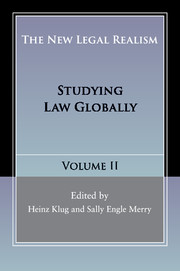Book contents
- Frontmatter
- Dedication
- Contents
- List of contributors
- Preface to The New Legal Realism, Volumes I and II
- 1 Introduction
- Section I The Globalization of Law
- Section II The Global Transfer of Norms
- Section III global institutions and the changing roles of judges and lawyers
- Section IV Global Justice
- 11 The Irreconcilable Goals of Transitional Justice
- 12 Pushing States to Prosecute Atrocity: The Inter-American Court and Positive Complementarity
- 13 When Law and Social Science Diverge: Causation in the International Law of Incitement to Commit Genocide
- Index
- References
13 - When Law and Social Science Diverge: Causation in the International Law of Incitement to Commit Genocide
from Section IV - Global Justice
Published online by Cambridge University Press: 05 May 2016
- Frontmatter
- Dedication
- Contents
- List of contributors
- Preface to The New Legal Realism, Volumes I and II
- 1 Introduction
- Section I The Globalization of Law
- Section II The Global Transfer of Norms
- Section III global institutions and the changing roles of judges and lawyers
- Section IV Global Justice
- 11 The Irreconcilable Goals of Transitional Justice
- 12 Pushing States to Prosecute Atrocity: The Inter-American Court and Positive Complementarity
- 13 When Law and Social Science Diverge: Causation in the International Law of Incitement to Commit Genocide
- Index
- References
Summary
Introduction
Prior to the outbreak of the armed conflict, the SDS started waging a propaganda war which had a disastrous impact on the people of all ethnicities, creating mutual fear and hatred and particularly inciting the Bosnian Serb population against the other ethnicities. Within a short period of time, citizens who had previously lived together peacefully became enemies and many of them, in the present case mainly Bosnian Serbs, became killers, influenced by a media, which by that time, was already under the control of the Bosnian Serb leadership.
Brđanin Trial Chamber Judgment (2004, ¶80)Over the past decade, there has been an appreciable shift at international criminal tribunals and in domestic legal proceedings toward greater criminalization of propaganda and inflammatory speech acts during armed conflict and genocide. During and after the 1994 genocide in Rwanda, observers emphasized the role of media propaganda in inciting ordinary Rwandans to participate in the extermination of 500,000 members of the Tutsi minority population, with one of the more influential accounts of the role of the media stating that the two main tools of the genocide were “the radio and the machete” (Chrétien, Dupaquier, Kabanda, and Ngarambe 1995, 191). As a steady stream of commentators referred to “radio genocide” and “death by radio” and “the soundtrack to genocide,” a widespread consensus emerged that key responsibility for the genocide lay with the Rwandan media.
A direct connection between media broadcasts and widespread human rights violations was articulated in successive judgments of the International Criminal Tribunal for Rwanda (ICTR) that found the defendant guilty of genocide and/or direct and public incitement to commit genocide. While the International Criminal Tribunal for the Former Yugoslavia (ICTY) never issued an indictment for direct and public incitement to commit genocide, defendants such as Radoslav Brđanin were charged with complicity to commit genocide, in part on the basis of their speeches. In a number of other ICTY trials, prosecutors have introduced evidence from speeches and propagandistic broadcasts as evidence of the defendant's participation in a joint criminal enterprise to commit crimes against humanity. Propaganda became one of the ICTY's overarching explanations for why neighbors became killers in the 1991–1995 conflict in the former Yugoslavia, as illustrated in the opening quote from the Brđanin Trial Chamber Judgment.
- Type
- Chapter
- Information
- The New Legal RealismStudying Law Globally, pp. 242 - 264Publisher: Cambridge University PressPrint publication year: 2016



